From the Beginning: Democratic Characteristics of English Colonies
VerifiedAdded on 2021/10/29
|8
|1675
|173
Essay
AI Summary
This essay examines the democratic characteristics present in the early English colonies of Virginia and Massachusetts, arguing that these colonies possessed democratic elements from their inception. The essay highlights key aspects such as the establishment of representative bodies like the Virginia House of Burgesses and the Mayflower Compact, which demonstrate self-governance and public participation. It explores the evolution of voting rights, though limited by property ownership and religious affiliation, and the development of a rule of law through colonial legislatures. The essay also acknowledges counterarguments, such as the presence of slavery and restricted suffrage, which challenge the extent of democracy. Despite these limitations, the essay concludes that the English colonies exhibited significant democratic characteristics, laying the groundwork for future democratic developments in America. The essay draws on historical evidence, including the formation of representative assemblies and the participation of citizens in town hall meetings and elections, to support its claims, referencing relevant sources to provide a comprehensive analysis of the topic.
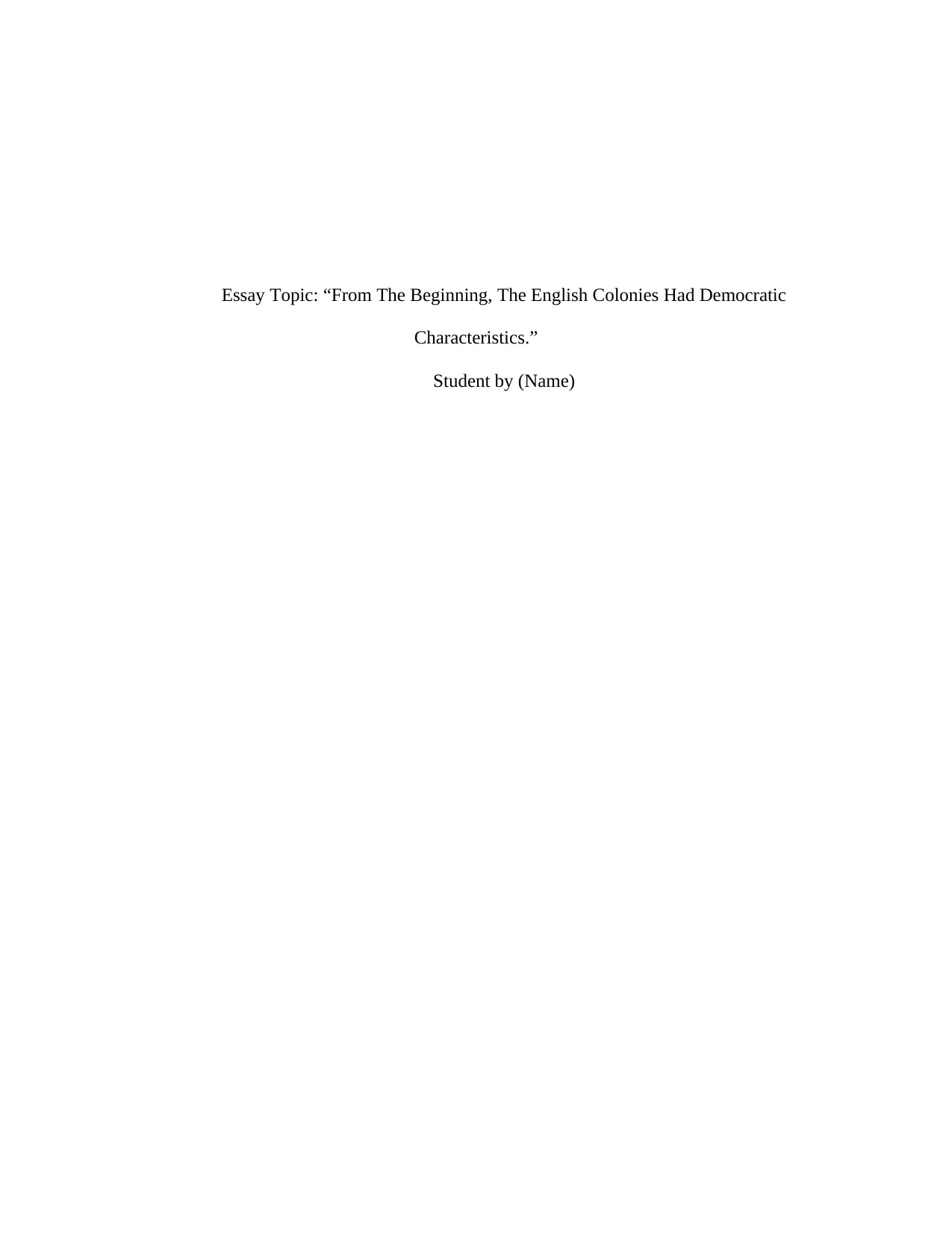
Essay Topic: “From The Beginning, The English Colonies Had Democratic
Characteristics.”
Student by (Name)
Characteristics.”
Student by (Name)
Paraphrase This Document
Need a fresh take? Get an instant paraphrase of this document with our AI Paraphraser
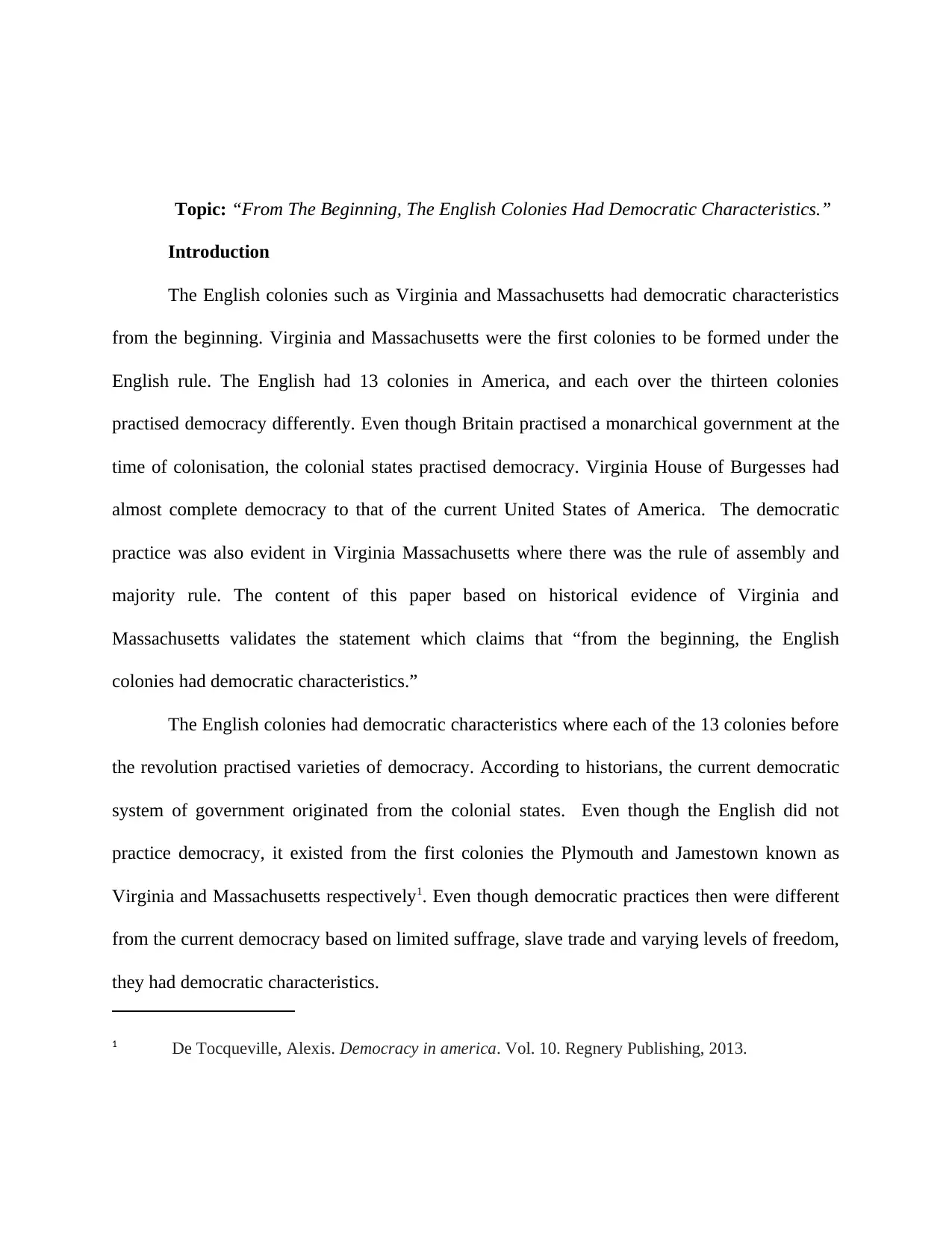
Topic: “From The Beginning, The English Colonies Had Democratic Characteristics.”
Introduction
The English colonies such as Virginia and Massachusetts had democratic characteristics
from the beginning. Virginia and Massachusetts were the first colonies to be formed under the
English rule. The English had 13 colonies in America, and each over the thirteen colonies
practised democracy differently. Even though Britain practised a monarchical government at the
time of colonisation, the colonial states practised democracy. Virginia House of Burgesses had
almost complete democracy to that of the current United States of America. The democratic
practice was also evident in Virginia Massachusetts where there was the rule of assembly and
majority rule. The content of this paper based on historical evidence of Virginia and
Massachusetts validates the statement which claims that “from the beginning, the English
colonies had democratic characteristics.”
The English colonies had democratic characteristics where each of the 13 colonies before
the revolution practised varieties of democracy. According to historians, the current democratic
system of government originated from the colonial states. Even though the English did not
practice democracy, it existed from the first colonies the Plymouth and Jamestown known as
Virginia and Massachusetts respectively1. Even though democratic practices then were different
from the current democracy based on limited suffrage, slave trade and varying levels of freedom,
they had democratic characteristics.
1 De Tocqueville, Alexis. Democracy in america. Vol. 10. Regnery Publishing, 2013.
Introduction
The English colonies such as Virginia and Massachusetts had democratic characteristics
from the beginning. Virginia and Massachusetts were the first colonies to be formed under the
English rule. The English had 13 colonies in America, and each over the thirteen colonies
practised democracy differently. Even though Britain practised a monarchical government at the
time of colonisation, the colonial states practised democracy. Virginia House of Burgesses had
almost complete democracy to that of the current United States of America. The democratic
practice was also evident in Virginia Massachusetts where there was the rule of assembly and
majority rule. The content of this paper based on historical evidence of Virginia and
Massachusetts validates the statement which claims that “from the beginning, the English
colonies had democratic characteristics.”
The English colonies had democratic characteristics where each of the 13 colonies before
the revolution practised varieties of democracy. According to historians, the current democratic
system of government originated from the colonial states. Even though the English did not
practice democracy, it existed from the first colonies the Plymouth and Jamestown known as
Virginia and Massachusetts respectively1. Even though democratic practices then were different
from the current democracy based on limited suffrage, slave trade and varying levels of freedom,
they had democratic characteristics.
1 De Tocqueville, Alexis. Democracy in america. Vol. 10. Regnery Publishing, 2013.
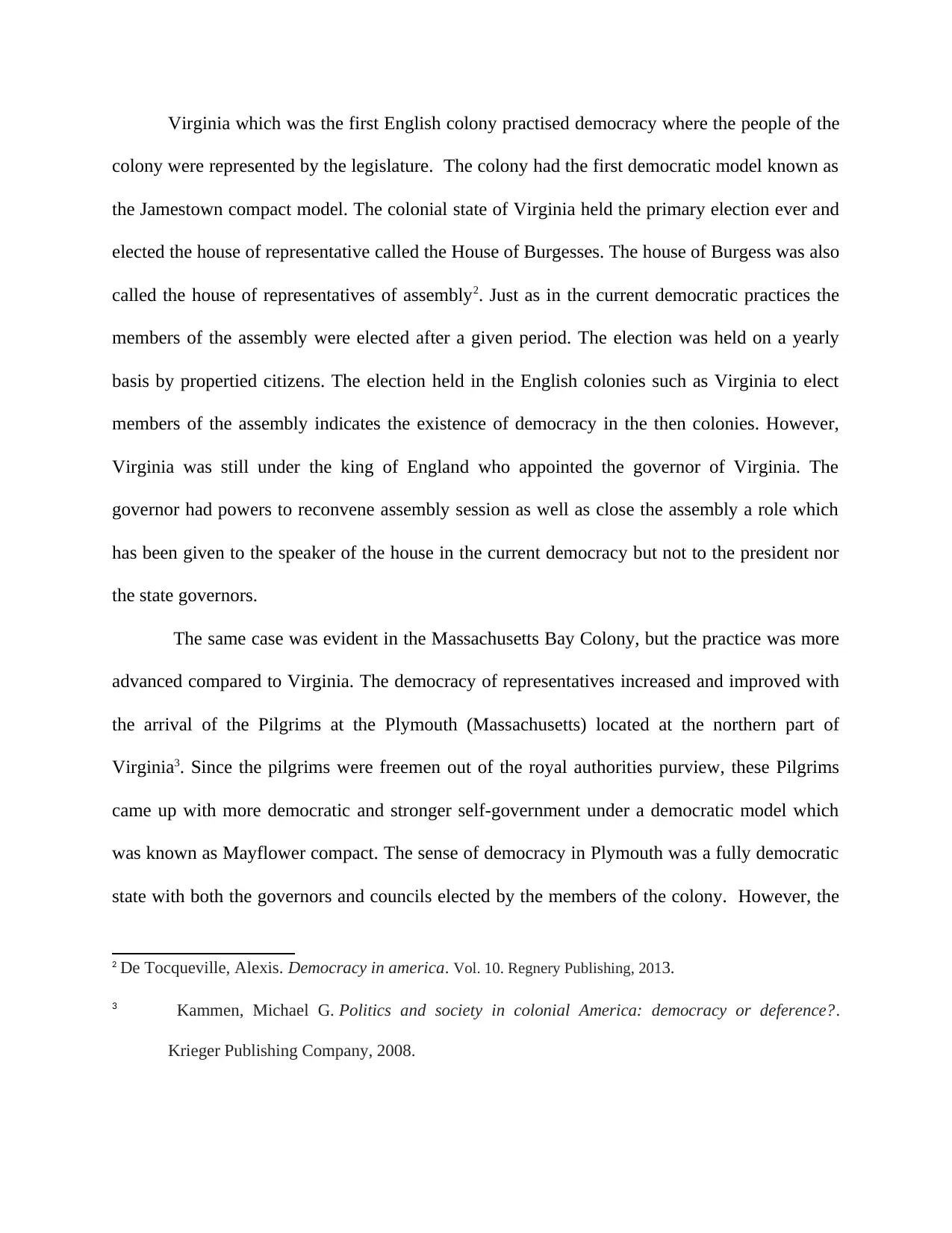
Virginia which was the first English colony practised democracy where the people of the
colony were represented by the legislature. The colony had the first democratic model known as
the Jamestown compact model. The colonial state of Virginia held the primary election ever and
elected the house of representative called the House of Burgesses. The house of Burgess was also
called the house of representatives of assembly2. Just as in the current democratic practices the
members of the assembly were elected after a given period. The election was held on a yearly
basis by propertied citizens. The election held in the English colonies such as Virginia to elect
members of the assembly indicates the existence of democracy in the then colonies. However,
Virginia was still under the king of England who appointed the governor of Virginia. The
governor had powers to reconvene assembly session as well as close the assembly a role which
has been given to the speaker of the house in the current democracy but not to the president nor
the state governors.
The same case was evident in the Massachusetts Bay Colony, but the practice was more
advanced compared to Virginia. The democracy of representatives increased and improved with
the arrival of the Pilgrims at the Plymouth (Massachusetts) located at the northern part of
Virginia3. Since the pilgrims were freemen out of the royal authorities purview, these Pilgrims
came up with more democratic and stronger self-government under a democratic model which
was known as Mayflower compact. The sense of democracy in Plymouth was a fully democratic
state with both the governors and councils elected by the members of the colony. However, the
2 De Tocqueville, Alexis. Democracy in america. Vol. 10. Regnery Publishing, 2013.
3 Kammen, Michael G. Politics and society in colonial America: democracy or deference?.
Krieger Publishing Company, 2008.
colony were represented by the legislature. The colony had the first democratic model known as
the Jamestown compact model. The colonial state of Virginia held the primary election ever and
elected the house of representative called the House of Burgesses. The house of Burgess was also
called the house of representatives of assembly2. Just as in the current democratic practices the
members of the assembly were elected after a given period. The election was held on a yearly
basis by propertied citizens. The election held in the English colonies such as Virginia to elect
members of the assembly indicates the existence of democracy in the then colonies. However,
Virginia was still under the king of England who appointed the governor of Virginia. The
governor had powers to reconvene assembly session as well as close the assembly a role which
has been given to the speaker of the house in the current democracy but not to the president nor
the state governors.
The same case was evident in the Massachusetts Bay Colony, but the practice was more
advanced compared to Virginia. The democracy of representatives increased and improved with
the arrival of the Pilgrims at the Plymouth (Massachusetts) located at the northern part of
Virginia3. Since the pilgrims were freemen out of the royal authorities purview, these Pilgrims
came up with more democratic and stronger self-government under a democratic model which
was known as Mayflower compact. The sense of democracy in Plymouth was a fully democratic
state with both the governors and councils elected by the members of the colony. However, the
2 De Tocqueville, Alexis. Democracy in america. Vol. 10. Regnery Publishing, 2013.
3 Kammen, Michael G. Politics and society in colonial America: democracy or deference?.
Krieger Publishing Company, 2008.
⊘ This is a preview!⊘
Do you want full access?
Subscribe today to unlock all pages.

Trusted by 1+ million students worldwide
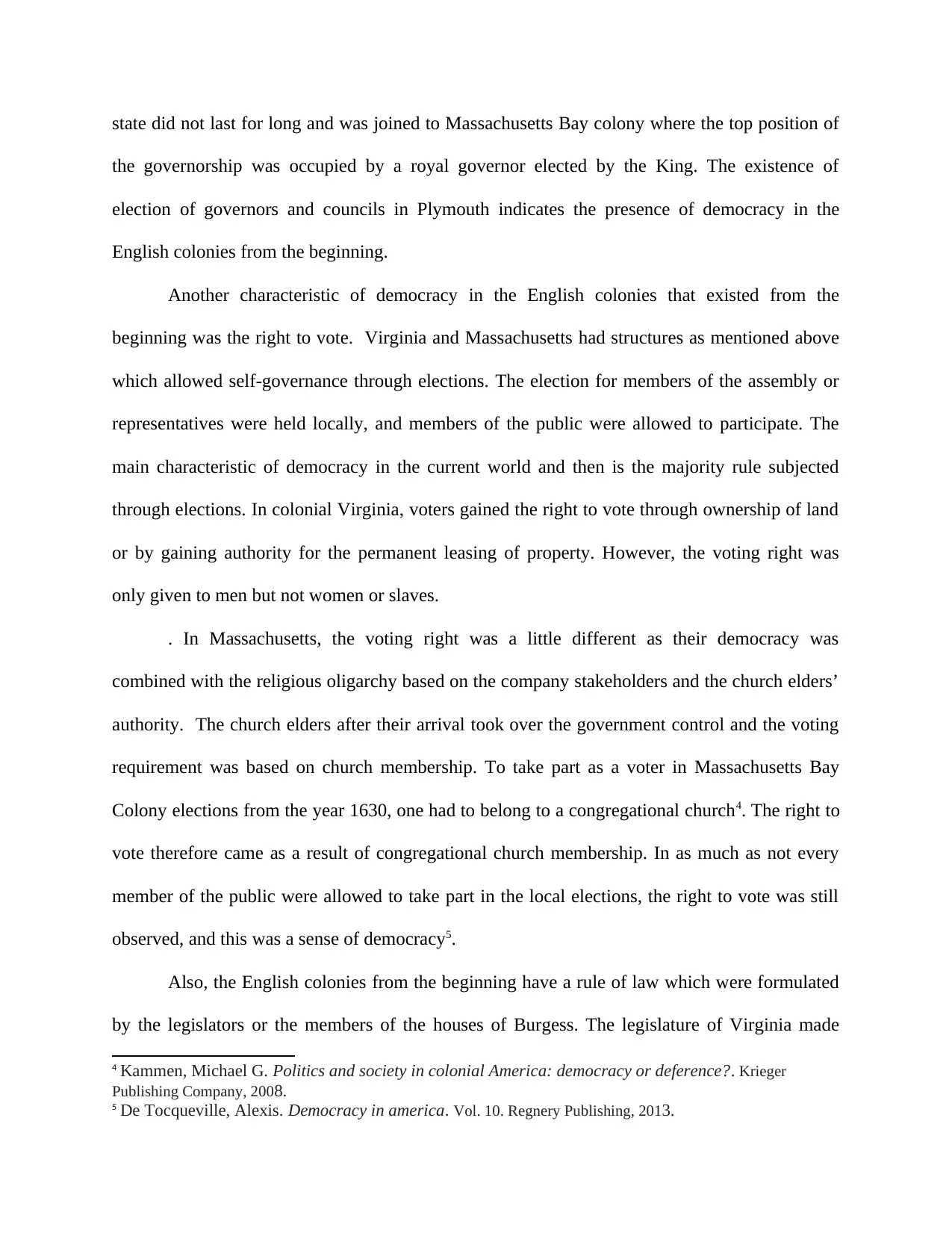
state did not last for long and was joined to Massachusetts Bay colony where the top position of
the governorship was occupied by a royal governor elected by the King. The existence of
election of governors and councils in Plymouth indicates the presence of democracy in the
English colonies from the beginning.
Another characteristic of democracy in the English colonies that existed from the
beginning was the right to vote. Virginia and Massachusetts had structures as mentioned above
which allowed self-governance through elections. The election for members of the assembly or
representatives were held locally, and members of the public were allowed to participate. The
main characteristic of democracy in the current world and then is the majority rule subjected
through elections. In colonial Virginia, voters gained the right to vote through ownership of land
or by gaining authority for the permanent leasing of property. However, the voting right was
only given to men but not women or slaves.
. In Massachusetts, the voting right was a little different as their democracy was
combined with the religious oligarchy based on the company stakeholders and the church elders’
authority. The church elders after their arrival took over the government control and the voting
requirement was based on church membership. To take part as a voter in Massachusetts Bay
Colony elections from the year 1630, one had to belong to a congregational church4. The right to
vote therefore came as a result of congregational church membership. In as much as not every
member of the public were allowed to take part in the local elections, the right to vote was still
observed, and this was a sense of democracy5.
Also, the English colonies from the beginning have a rule of law which were formulated
by the legislators or the members of the houses of Burgess. The legislature of Virginia made
4 Kammen, Michael G. Politics and society in colonial America: democracy or deference?. Krieger
Publishing Company, 2008.
5 De Tocqueville, Alexis. Democracy in america. Vol. 10. Regnery Publishing, 2013.
the governorship was occupied by a royal governor elected by the King. The existence of
election of governors and councils in Plymouth indicates the presence of democracy in the
English colonies from the beginning.
Another characteristic of democracy in the English colonies that existed from the
beginning was the right to vote. Virginia and Massachusetts had structures as mentioned above
which allowed self-governance through elections. The election for members of the assembly or
representatives were held locally, and members of the public were allowed to participate. The
main characteristic of democracy in the current world and then is the majority rule subjected
through elections. In colonial Virginia, voters gained the right to vote through ownership of land
or by gaining authority for the permanent leasing of property. However, the voting right was
only given to men but not women or slaves.
. In Massachusetts, the voting right was a little different as their democracy was
combined with the religious oligarchy based on the company stakeholders and the church elders’
authority. The church elders after their arrival took over the government control and the voting
requirement was based on church membership. To take part as a voter in Massachusetts Bay
Colony elections from the year 1630, one had to belong to a congregational church4. The right to
vote therefore came as a result of congregational church membership. In as much as not every
member of the public were allowed to take part in the local elections, the right to vote was still
observed, and this was a sense of democracy5.
Also, the English colonies from the beginning have a rule of law which were formulated
by the legislators or the members of the houses of Burgess. The legislature of Virginia made
4 Kammen, Michael G. Politics and society in colonial America: democracy or deference?. Krieger
Publishing Company, 2008.
5 De Tocqueville, Alexis. Democracy in america. Vol. 10. Regnery Publishing, 2013.
Paraphrase This Document
Need a fresh take? Get an instant paraphrase of this document with our AI Paraphraser
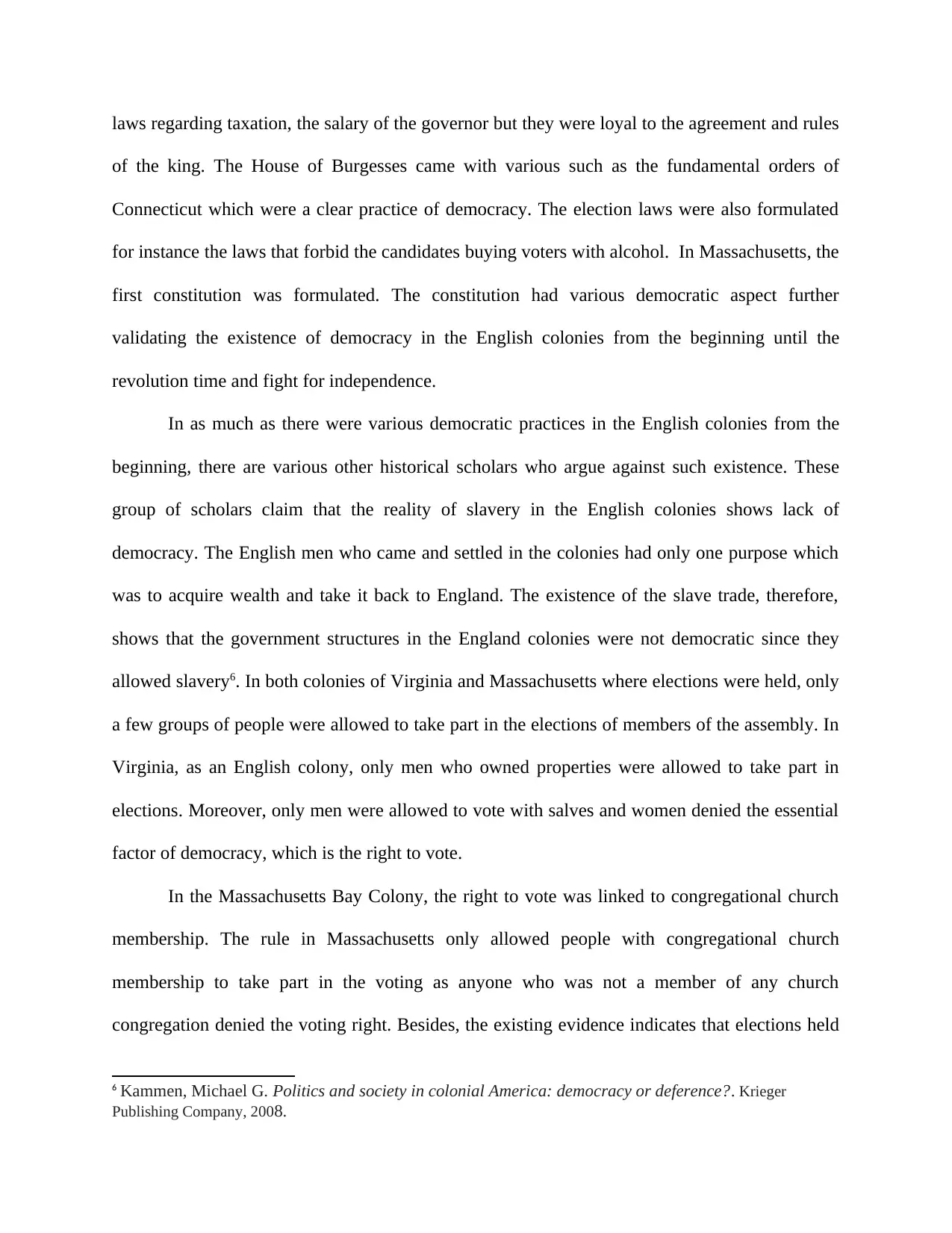
laws regarding taxation, the salary of the governor but they were loyal to the agreement and rules
of the king. The House of Burgesses came with various such as the fundamental orders of
Connecticut which were a clear practice of democracy. The election laws were also formulated
for instance the laws that forbid the candidates buying voters with alcohol. In Massachusetts, the
first constitution was formulated. The constitution had various democratic aspect further
validating the existence of democracy in the English colonies from the beginning until the
revolution time and fight for independence.
In as much as there were various democratic practices in the English colonies from the
beginning, there are various other historical scholars who argue against such existence. These
group of scholars claim that the reality of slavery in the English colonies shows lack of
democracy. The English men who came and settled in the colonies had only one purpose which
was to acquire wealth and take it back to England. The existence of the slave trade, therefore,
shows that the government structures in the England colonies were not democratic since they
allowed slavery6. In both colonies of Virginia and Massachusetts where elections were held, only
a few groups of people were allowed to take part in the elections of members of the assembly. In
Virginia, as an English colony, only men who owned properties were allowed to take part in
elections. Moreover, only men were allowed to vote with salves and women denied the essential
factor of democracy, which is the right to vote.
In the Massachusetts Bay Colony, the right to vote was linked to congregational church
membership. The rule in Massachusetts only allowed people with congregational church
membership to take part in the voting as anyone who was not a member of any church
congregation denied the voting right. Besides, the existing evidence indicates that elections held
6 Kammen, Michael G. Politics and society in colonial America: democracy or deference?. Krieger
Publishing Company, 2008.
of the king. The House of Burgesses came with various such as the fundamental orders of
Connecticut which were a clear practice of democracy. The election laws were also formulated
for instance the laws that forbid the candidates buying voters with alcohol. In Massachusetts, the
first constitution was formulated. The constitution had various democratic aspect further
validating the existence of democracy in the English colonies from the beginning until the
revolution time and fight for independence.
In as much as there were various democratic practices in the English colonies from the
beginning, there are various other historical scholars who argue against such existence. These
group of scholars claim that the reality of slavery in the English colonies shows lack of
democracy. The English men who came and settled in the colonies had only one purpose which
was to acquire wealth and take it back to England. The existence of the slave trade, therefore,
shows that the government structures in the England colonies were not democratic since they
allowed slavery6. In both colonies of Virginia and Massachusetts where elections were held, only
a few groups of people were allowed to take part in the elections of members of the assembly. In
Virginia, as an English colony, only men who owned properties were allowed to take part in
elections. Moreover, only men were allowed to vote with salves and women denied the essential
factor of democracy, which is the right to vote.
In the Massachusetts Bay Colony, the right to vote was linked to congregational church
membership. The rule in Massachusetts only allowed people with congregational church
membership to take part in the voting as anyone who was not a member of any church
congregation denied the voting right. Besides, the existing evidence indicates that elections held
6 Kammen, Michael G. Politics and society in colonial America: democracy or deference?. Krieger
Publishing Company, 2008.
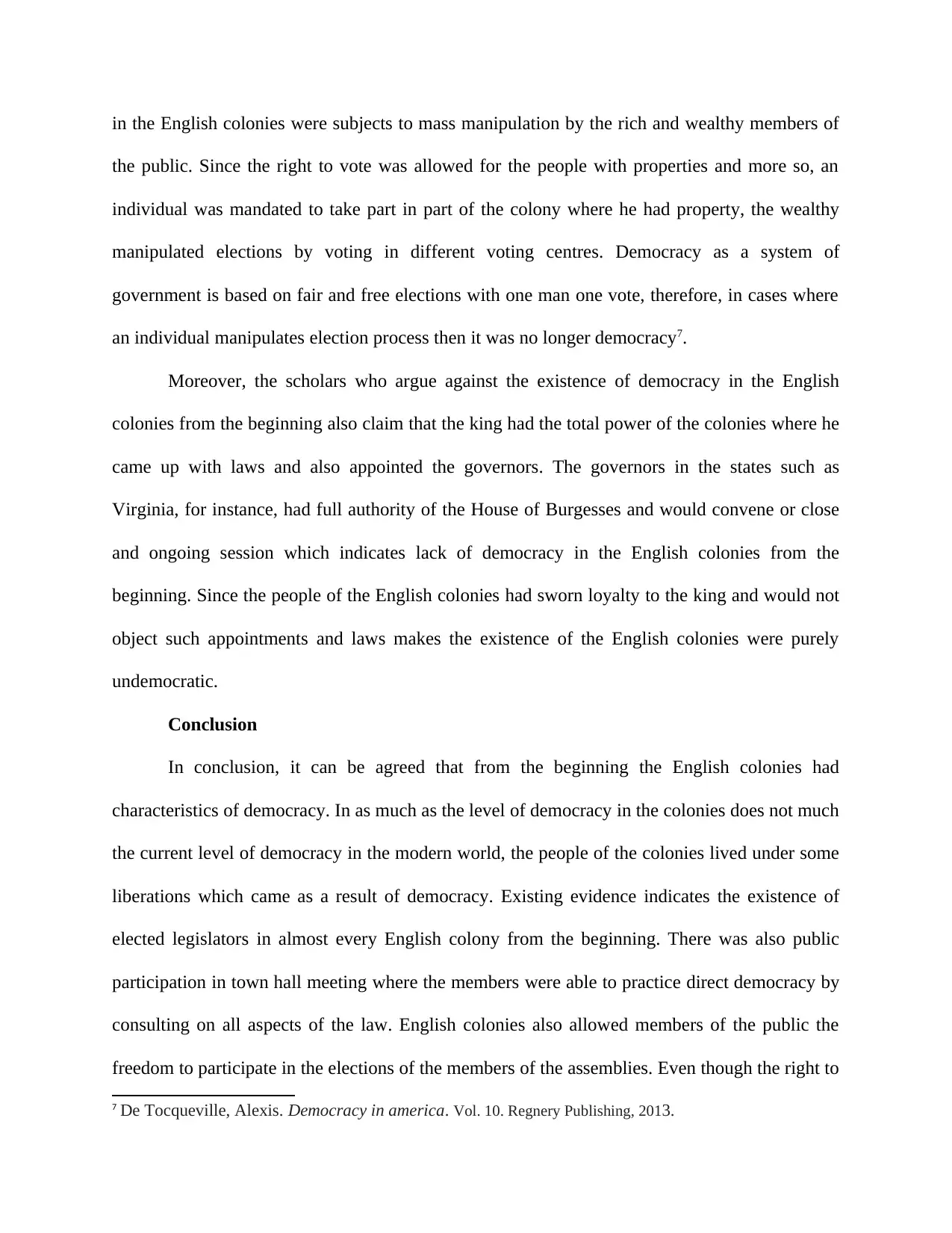
in the English colonies were subjects to mass manipulation by the rich and wealthy members of
the public. Since the right to vote was allowed for the people with properties and more so, an
individual was mandated to take part in part of the colony where he had property, the wealthy
manipulated elections by voting in different voting centres. Democracy as a system of
government is based on fair and free elections with one man one vote, therefore, in cases where
an individual manipulates election process then it was no longer democracy7.
Moreover, the scholars who argue against the existence of democracy in the English
colonies from the beginning also claim that the king had the total power of the colonies where he
came up with laws and also appointed the governors. The governors in the states such as
Virginia, for instance, had full authority of the House of Burgesses and would convene or close
and ongoing session which indicates lack of democracy in the English colonies from the
beginning. Since the people of the English colonies had sworn loyalty to the king and would not
object such appointments and laws makes the existence of the English colonies were purely
undemocratic.
Conclusion
In conclusion, it can be agreed that from the beginning the English colonies had
characteristics of democracy. In as much as the level of democracy in the colonies does not much
the current level of democracy in the modern world, the people of the colonies lived under some
liberations which came as a result of democracy. Existing evidence indicates the existence of
elected legislators in almost every English colony from the beginning. There was also public
participation in town hall meeting where the members were able to practice direct democracy by
consulting on all aspects of the law. English colonies also allowed members of the public the
freedom to participate in the elections of the members of the assemblies. Even though the right to
7 De Tocqueville, Alexis. Democracy in america. Vol. 10. Regnery Publishing, 2013.
the public. Since the right to vote was allowed for the people with properties and more so, an
individual was mandated to take part in part of the colony where he had property, the wealthy
manipulated elections by voting in different voting centres. Democracy as a system of
government is based on fair and free elections with one man one vote, therefore, in cases where
an individual manipulates election process then it was no longer democracy7.
Moreover, the scholars who argue against the existence of democracy in the English
colonies from the beginning also claim that the king had the total power of the colonies where he
came up with laws and also appointed the governors. The governors in the states such as
Virginia, for instance, had full authority of the House of Burgesses and would convene or close
and ongoing session which indicates lack of democracy in the English colonies from the
beginning. Since the people of the English colonies had sworn loyalty to the king and would not
object such appointments and laws makes the existence of the English colonies were purely
undemocratic.
Conclusion
In conclusion, it can be agreed that from the beginning the English colonies had
characteristics of democracy. In as much as the level of democracy in the colonies does not much
the current level of democracy in the modern world, the people of the colonies lived under some
liberations which came as a result of democracy. Existing evidence indicates the existence of
elected legislators in almost every English colony from the beginning. There was also public
participation in town hall meeting where the members were able to practice direct democracy by
consulting on all aspects of the law. English colonies also allowed members of the public the
freedom to participate in the elections of the members of the assemblies. Even though the right to
7 De Tocqueville, Alexis. Democracy in america. Vol. 10. Regnery Publishing, 2013.
⊘ This is a preview!⊘
Do you want full access?
Subscribe today to unlock all pages.

Trusted by 1+ million students worldwide

vote was not for everyone in the colonies, it was a sense of democracy. Just as the modern
legislators, the members of the assemblies and the councils took part in lawmaking and also
showed a spirit of democracy by supporting the colony against unworthy laws from the king. The
English colonies existence indeed showed characteristics of democracy.
legislators, the members of the assemblies and the councils took part in lawmaking and also
showed a spirit of democracy by supporting the colony against unworthy laws from the king. The
English colonies existence indeed showed characteristics of democracy.
Paraphrase This Document
Need a fresh take? Get an instant paraphrase of this document with our AI Paraphraser
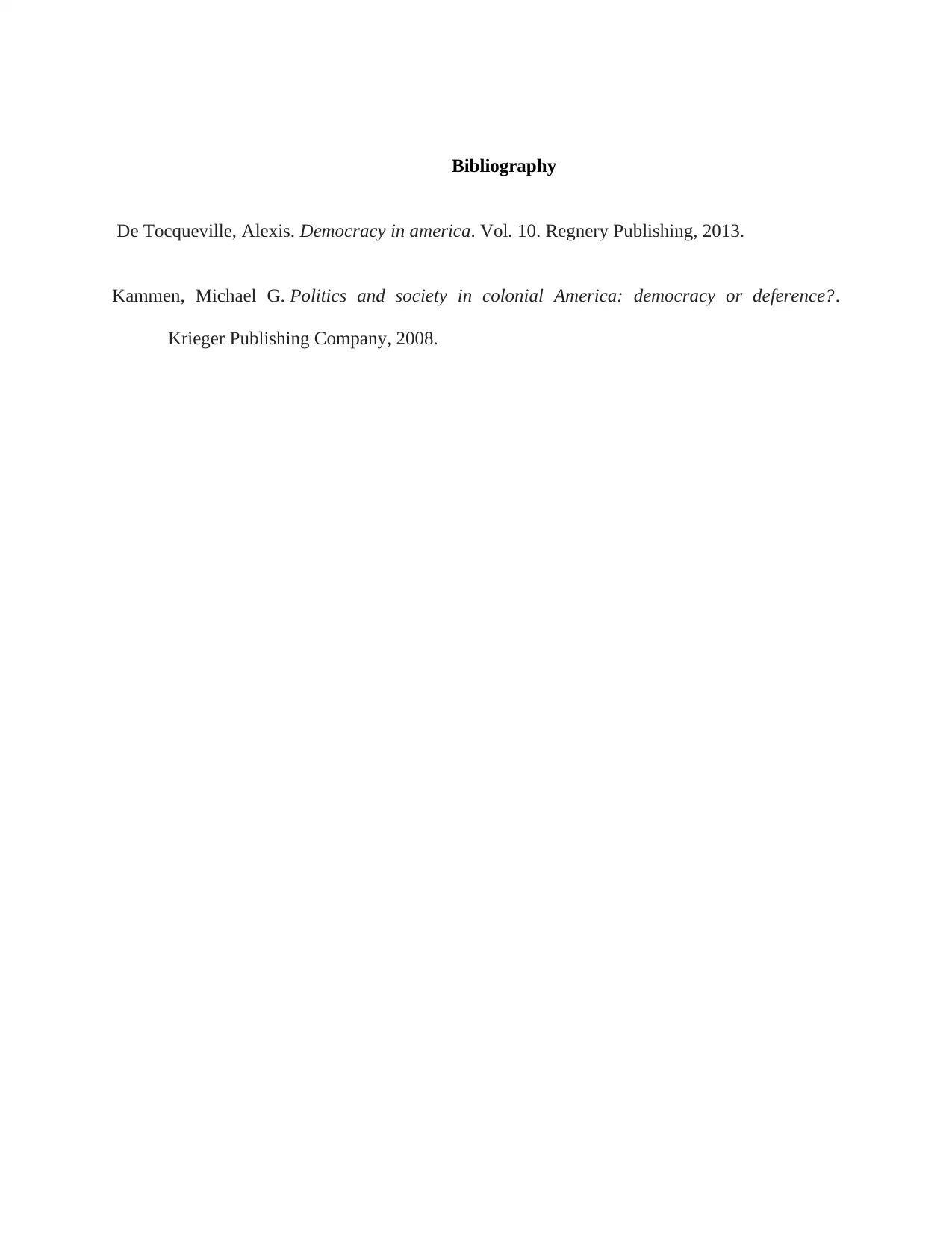
Bibliography
De Tocqueville, Alexis. Democracy in america. Vol. 10. Regnery Publishing, 2013.
Kammen, Michael G. Politics and society in colonial America: democracy or deference?.
Krieger Publishing Company, 2008.
De Tocqueville, Alexis. Democracy in america. Vol. 10. Regnery Publishing, 2013.
Kammen, Michael G. Politics and society in colonial America: democracy or deference?.
Krieger Publishing Company, 2008.
1 out of 8
Your All-in-One AI-Powered Toolkit for Academic Success.
+13062052269
info@desklib.com
Available 24*7 on WhatsApp / Email
![[object Object]](/_next/static/media/star-bottom.7253800d.svg)
Unlock your academic potential
Copyright © 2020–2026 A2Z Services. All Rights Reserved. Developed and managed by ZUCOL.